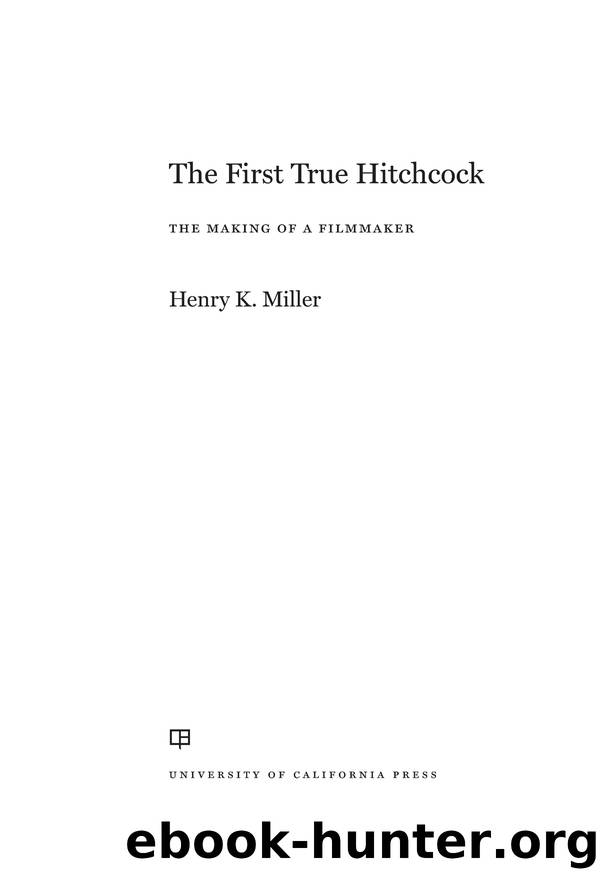The First True Hitchcock by Henry K. Miller

Author:Henry K. Miller
Language: eng
Format: epub
Publisher: University of California Press
We were with his ex-wife and her husband, and sitting behind us were Babe Barnato, with June (later Lady Inverclyde). He and his ex-wife were sincerely hearty in their greetings & the presence of the husband and June did not seem to embarrass them at all. During the interval we three men met in the bar and had a jolly manly chat about the jolly, thrilling play and then parted.
I liked Babeâs easy manner. He was keen physically & mentally and seemed unspoiled by his riches.
At the end of 1925, June and Carlyle Blackwell had appeared opposite one another in one of a series of short films starring the jockey Steve Donoghue, produced at Poole Street âby Gainsborough Pictures for C. & M. Productions,â essentially W. &. F. acting as producer. It was Juneâs first film appearance in five years.
Gainsboroughâs access to the Barnato fortune puts a different complexion on Balcon and Woolfâs rugged declarations of independence. âLetâs win our better equipment like any other business, through our own ability,â rather than seek state subsidy, Balcon the 100 percent free trader had written in 1925.37 âThe making of British films must, in my opinion, be the subject of individual endeavour,â Woolf had written in March 1926.38 Without the Barnatosâ money, W. & F.âs future was bleak. Its most recent Harold Lloyd picture, College Days, as The Freshman was titled in Britain, premiered at the New Gallery in November 1925 and released in January 1926, was to be its last. Lloyd had signed a new worldwide distribution contract with Paramount, starting with For Heavenâs Sakeâwhich when it opened in September became the first film to run at the Plaza for more than a week.
Within a few months, virtually all major American productions would be in the hands of American-controlled distributors. Warner Brothers, the last significant studio to rent through an independent British firm, had announced in February 1926 that it would distribute its films on its own accountâmore precisely, through the venerable Vitagraph network, which it had recently acquiredâonce the Gaumont contract ended that autumn. British distributors were left with the output of Poverty Row, continental imports, and British filmsâand the first category left C. M. Woolf unimpressed, as he told G. A. Atkinson in August:
Download
This site does not store any files on its server. We only index and link to content provided by other sites. Please contact the content providers to delete copyright contents if any and email us, we'll remove relevant links or contents immediately.
Naked as Nature Intended by Pamela Green(452)
The Filmmaker's Guide to Creatively Embracing Limitations: Not Getting What You Want Leading to Creating What You Need (for True Epub) by Pace William & Stobbe Ingrid(445)
30 Movies to Get You Through the Holidays by Roger Ebert(418)
Bond, James Bond by Brad Gilmore(386)
It's Only a Movie! by Haberski Jr. Raymond J(354)
The Making Of Horror Movies by Jennifer Selway(330)
How To Write A Novel The Easy Way Using The Pulp Fiction Method To Write Better Novels: Writing Skills by Jim Driver(313)
Chinese films in focus II by Unknown(312)
Smartphone Cinema: Making Great Films with Your Mobile Phone by Bart Weiss(310)
The Fellowship of the Knits: Lord of the Rings: The Unofficial Knitting Book by Tanis Gray(309)
Charles McGraw by Alan K. Rode(290)
Film Truth; November, 1920 by Anonymous(287)
Thomas Mann and Friedrich Nietzsche: Eroticism, Death, Music, and Laughter by Caroline Joan Picart(286)
The Greatest Show on Earth by Jerry Pinto(284)
The Romanian Cinema of Nationalism: Historical Films as Propaganda and Spectacle by Onoriu Colăcel(268)
Jurassic Park and Philosophy by Watkins Jessica Michaud Nicolas(264)
The Garden in the Machine by Unknown(262)
Jafar Panahi: Interviews by Unknown(258)
The Reel Truth by Reed Martin(258)
